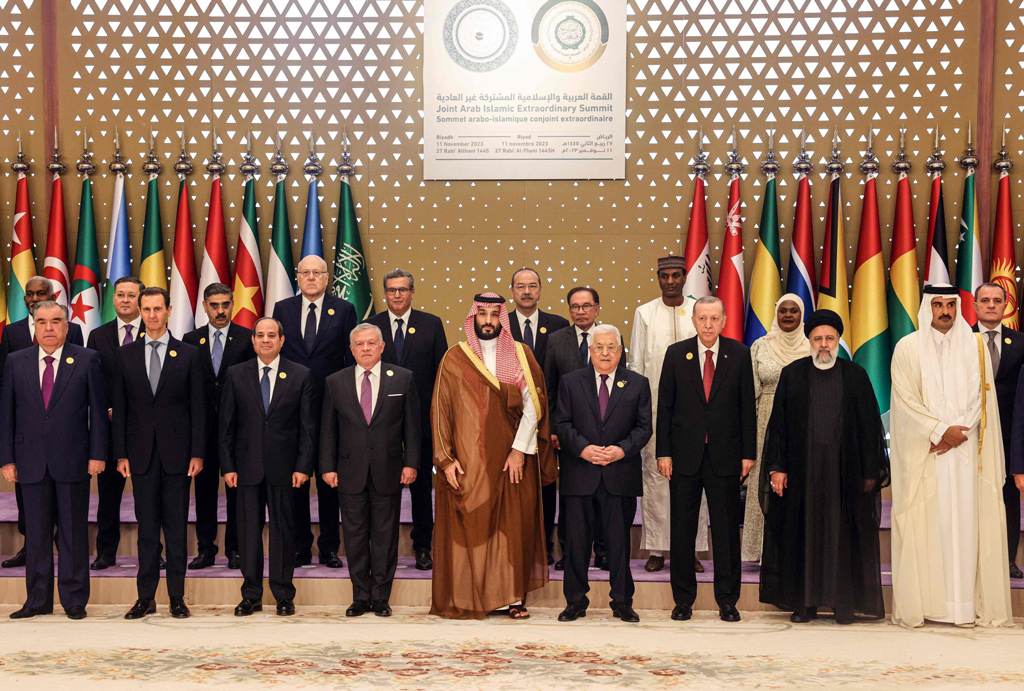President Recep Tayyip Erdoğan attended the Organisation of Islamic Cooperation’s (OIC) extraordinary summit on Saturday to develop a “joint Islamic position in the face of the brutal and ongoing Israeli aggression” against the Palestinians.
Ahead of the meeting, the organization issued a statement to underscore that the event was held in response to the “dangerous developments” regarding the Palestinian question and the city of Jerusalem. In other words, that statement mentioned the protection of Jerusalem, the OIC’s original objective and the prevention of the massacre in Gaza simultaneously.
Although it was Saudi Arabia that called for the eighth extraordinary summit, Türkiye also continues to make a serious effort to get the OIC to take the initiative regarding a cease-fire in Gaza and the two-state solution. Indeed, President Erdoğan told reporters on his flight back from Tashkent, Uzbekistan, last week that he attached great importance to the summit in Riyadh: “We will focus on what each of the attending nations can do individually. The Islamic nations obviously care for the Palestinian cause and there is much we can do to facilitate a cease-fire and promote lasting peace. We should be strong and active to serve peace. Taking poorly planned steps in the absence of a strategy would harm the Palestinian cause first and foremost.”
Major step
Stressing that joint decisions would represent a “major step toward stopping the Israeli oppression,” the Turkish leader expected the summit to mount pressure on Israel and its supporters. At the same time, the debate related to the problem that Israel represents in the region. On the anniversary of republic founder Mustafa Kemal Atatürk’s passing, Erdoğan recalled Israeli Prime Minister Benjamin Netanyahu’s comments on the prophecy of Isaiah and an Israeli official’s threat of nuclear attacks before making the following statement: “They test our patience with delusions about the promised land, which includes part of our country’s territory, and with the threat of using nuclear weapons.”
In addition to engaging in dialogue with OIC members and other countries in the region, the Turkish president plans to increase his diplomatic contacts with fellow world leaders within the framework of the global initiative for Gaza. Designed to “increase the number of member states supporting righteousness and justice at the United Nations,” that effort shall represent an important step to mobilize the West and the non-Western world. To be clear, Ankara does not just seek to facilitate a cease-fire and the delivery of humanitarian aid to Gaza. It also wants to create a road map for a “just and permanent” solution to the Israeli-Palestinian conflict through guarantorship.
A critical question
What will happen in the aftermath of the ongoing conflict, which could last between three to four weeks to a couple of months, according to various experts, remains a critically important question. The United States, too, rejects the idea of Israel occupying Gaza indefinitely and the expulsion of all Palestinians from their native lands. It goes without saying that Israel, which currently occupies the northern sections of Gaza, cannot possibly eliminate Hamas or its military capabilities, even if it were to occupy the entire region.
Having realized that Netanyahu lacks a workable plan, the Biden administration promptly promised that Gaza would not become smaller as it attempts to make plans for the potential cease-fire’s aftermath. Countries in the region, including Egypt and Jordan, rejected a proposal whereby Israel would complete its aerial and ground operations before handing over Gaza to a handful of Arab states. In the absence of a clear path to the two-state solution, hardly anyone volunteers to defend Israel against Hamas, the Islamic Jihad or similar organizations. Indeed, Ankara, too, rejects the attempt to reduce its proposed guarantorship to the cease-fire.
Another important point is that various alternatives, including the creation of a post-Hamas situation in Gaza and that area’s handover to the Palestinian Authority, remain impractical. After all, the Palestinian Authority would effectively lose control over the West Bank if it were to govern Gaza after Israel’s massacre.
It seems that the Gaza crisis won’t be resolved easily. Even if the ongoing clashes do not spill over to other parts of the region, the current situation will negatively impact the priorities of the U.S. and Western governments (such as the war in Ukraine) and their efforts to contain China, Russia and Iran.
The Islamic nations gathered in Saudi Arabia against that backdrop to discuss the Palestinian cause and the Israel problem. The world watched the OIC members closely as they attempted to set aside their differences to develop a common stance for a solution.
[Daily Sabah, November 13, 2023]







